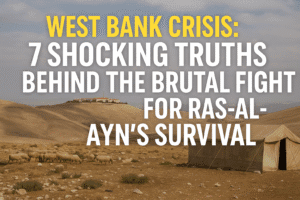West Bank Crisis: 7 Shocking Truths Behind the Brutal Fight for Ras al-Ayn’s Survival
Palestinian families in Ras al-Ayn describe being terrorized off their ancestral lands by armed Israeli settlers using violence, theft, and intimidation. Settlers cut water access, steal livestock (like Salaam Ka’abneh’s 2,000 sheep), and launch daily attacks to deliberately make life unbearable. Despite Israel’s legal duty as occupier to protect civilians, human rights groups document near-total impunity for settlers, who often operate with tacit state support.
Israel’s plan to legalize 22 new West Bank settlements further entrenches this displacement. Activists and observers report Israeli forces frequently fail to intervene during assaults. Experts like B’Tselem’s Sarit Michaeli condemn this as state-sanctioned “daylight robbery” amounting to ethnic cleansing, shrinking any future Palestinian state. International pressure, including UK sanctions on settler leaders, grows but hasn’t halted the campaign of fear eroding these communities.

West Bank Crisis: 7 Shocking Truths Behind the Brutal Fight for Ras al-Ayn’s Survival
The road to Ras al-Ayn feels like entering a landscape under siege. Palestinian flags hang limp in the dusty air, a stark contrast to the freshly paved roads leading to the fortified Israeli outposts perched on the surrounding hilltops. Here, in the Jordan Valley’s Area C, a quiet battle rages – not with armies, but with sheep, water access, and the crushing weight of daily terror.
The View from Salaam Ka’abneh’s Tent:
Salaam Ka’abneh gestures towards the barren hillsides where his family once freely grazed their flocks. “For over 50 years, this was our life,” he states, his voice etched with exhaustion. “Now? Settlers cut our water pipes. They stole over 2,000 sheep from our compound in Tel Al-Auja. They come day and night – throwing stones, firing bullets, driving their trucks through our encampments to terrify our children and women.”
His story isn’t unique. Across Ras al-Ayn and neighboring villages, Palestinians describe a deliberate, escalating campaign. Settlers, often armed and filmed driving aggressively through Palestinian areas, systematically isolate communities. Grazing lands are blocked. Water sources are severed. Livelihoods vanish. The goal, as documented by activists like Rachel Abramovitz who filmed settlers attempting to seize the village center, appears clear: make life unbearable until people flee.
A System Sanctioned? The Mechanics of Displacement:
This isn’t random lawlessness. Human rights organizations like Israel’s B’Tselem paint a picture of systemic impunity. Sarit Michaeli of B’Tselem cuts to the core: “Israel doesn’t hold settlers accountable. Settlers know they’ll receive support. They function as a branch of the government. It’s daylight robbery of land – sanctioned.”
International law obligates Israel, as the occupying power in the West Bank, to protect civilians under its control. Yet, Palestinians and observers report Israeli security forces frequently present but unresponsive during settler attacks, or arriving too late. The recent Israeli announcement of plans to establish 22 new settlements (including legalizing existing outposts) further signals state backing for the settler project. As settler leader Daniella Weiss bluntly declared: “We annex with facts on the ground… to block any Palestinian state.”
The Human Toll: More Than Just Land Lost:
The impact transcends property. It’s psychological warfare:
- Children Traumatized: Constant fear of violence disrupts sleep, schooling, and any sense of normal childhood.
- Communities Fractured: Traditional ways of life, especially for Bedouin families reliant on herding, become impossible, severing cultural ties to the land.
- A Future Erased: The deliberate fragmentation of Palestinian territory through settlements, outposts, and military zones shrinks the physical and political space for a viable future state.
International Scrutiny Grows – But Will it Matter?
Mounting evidence of settler violence and state complicity has prompted some international action. The UK’s recent sanctions on key figures like Daniella Weiss mark a significant step. Yet, for families like the Ka’abnehs, sanctions feel distant. Their immediate reality is one of siege – caged sheep, denied water, and the relentless pressure of a powerful movement actively working to replace them.
The Unanswered Question:
When Sky News journalists attempted to approach a settler outpost overlooking Ras al-Ayn, their car was swiftly surrounded by hostile settlers. The message was unambiguous: outsiders documenting the Palestinian experience are unwelcome. This enforced opacity shields the settlers’ actions and deepens the isolation of vulnerable communities.
The Core Insight:
What unfolds in Ras al-Ayn is not merely a “land dispute.” It’s the slow-motion erasure of a community. It represents a strategy leveraging intimidation, bureaucratic neglect, and state-supported settlement expansion to achieve a demographic goal: clearing Palestinians from coveted land. The terror isn’t incidental; it’s the engine driving displacement. The world watches, labels it “ethnic cleansing” or “creeping annexation,” but for Salaam Ka’abneh, the only label that matters is the reality of his vanishing home. The question remains: will the mechanisms of international law and pressure be enough to halt a process sustained by facts aggressively created on the ground?
You must be logged in to post a comment.